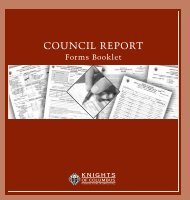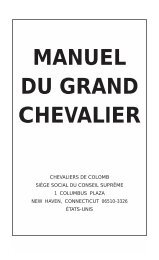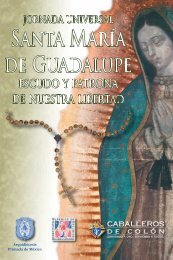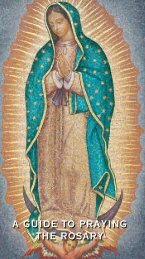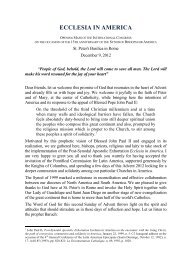Download PDF - Knights of Columbus, Supreme Council
Download PDF - Knights of Columbus, Supreme Council
Download PDF - Knights of Columbus, Supreme Council
Create successful ePaper yourself
Turn your PDF publications into a flip-book with our unique Google optimized e-Paper software.
VVERITAS<br />
Catholic Sexual Ethics<br />
Dr. William E. May
The <strong>Knights</strong> <strong>of</strong> <strong>Columbus</strong> presents<br />
The Veritas Series<br />
“Proclaiming the Faith in the Third Millennium”<br />
Catholic Sexual Ethics<br />
by<br />
DR. WILLIAM E. MAY<br />
General Editor<br />
Father John A. Farren, O.P.<br />
Director <strong>of</strong> the Catholic Information Service<br />
<strong>Knights</strong> <strong>of</strong> <strong>Columbus</strong> <strong>Supreme</strong> <strong>Council</strong>
Nihil obstat<br />
Censor Deputatus<br />
Reverend Isidore Dixon<br />
Imprimatur<br />
Reverend Monsignor Kevin Farrell<br />
Vicar General for the Archbishop <strong>of</strong> Washington<br />
April 26, 2001<br />
The Nihil obstat and Imprimatur are <strong>of</strong>ficial declarations that a book or pamphlet is<br />
free <strong>of</strong> doctrinal or moral error. No implication is contained therein that those who<br />
have granted the nihil obstat and imprimatur agree with the content, opinions or<br />
statements expressed.<br />
Copyright © 2001 by <strong>Knights</strong> <strong>of</strong> <strong>Columbus</strong> <strong>Supreme</strong> <strong>Council</strong>. All rights reserved.<br />
Cover: © PhotoDisc Inc.<br />
No part <strong>of</strong> this book may be reproduced or transmitted in any form or by any means,<br />
electronic or mechanical, including photocopying, recording, or by information<br />
storage and retrieval system, without permission in writing from the publisher.<br />
Write:<br />
Catholic Information Service<br />
<strong>Knights</strong> <strong>of</strong> <strong>Columbus</strong> <strong>Supreme</strong> <strong>Council</strong><br />
PO Box 1971<br />
New Haven, CT 06521-1971<br />
www.k<strong>of</strong>c.org/cis<br />
cis@k<strong>of</strong>c.org<br />
203-752-4267<br />
203-752-4018 fax<br />
Printed in the United States <strong>of</strong> America
CONTENTS<br />
Introduction . . . . . . . . . . . . . . . . . . . . . . . . . . . . . . . . . . . . . . . . . . . 5<br />
The Dignity <strong>of</strong> the Human Person . . . . . . . . . . . . . . . . . . . . . . . . . . 6<br />
The Existential, Religious Significance<br />
<strong>of</strong> Human Acts as Freely Chosen . . . . . . . . . . . . . . . . . . . . . . . . . 8<br />
Norms for Making True Moral Judgments<br />
and Good Moral Choices . . . . . . . . . . . . . . . . . . . . . . . . . . . . . . . . . . . 10<br />
Major Issues in Sexual Ethics . . . . . . . . . . . . . . . . . . . . . . . . . . . . . 15<br />
The Goods at Stake in Sexual Choices . . . . . . . . . . . . . . . . . . . . 15<br />
Evaluating Specific Kinds <strong>of</strong> Sexual Acts . . . . . . . . . . . . . . . . . . 17<br />
Conclusion . . . . . . . . . . . . . . . . . . . . . . . . . . . . . . . . . . . . . . . . . . . 26<br />
Endnotes. . . . . . . . . . . . . . . . . . . . . . . . . . . . . . . . . . . . . . . . . . . . . 29<br />
About the Author. . . . . . . . . . . . . . . . . . . . . . . . . . . . . . . . . . . . . . 34<br />
- 3 -
- 4 -
INTRODUCTION<br />
In some ways the teaching <strong>of</strong> the Catholic Church on sexual<br />
ethics is well known. Most people know what the Church teaches.<br />
Her basic teaching is this: one can rightly choose to exercise one’s<br />
genital sexual powers only when one, as a spouse, freely chooses to<br />
engage in the conjugal act and, in that act, chooses to respect fully<br />
the goods <strong>of</strong> mutual self-giving and <strong>of</strong> human procreation. From<br />
this it follows that it is never morally right to unite sexually outside<br />
<strong>of</strong> marriage, i.e., to fornicate or commit adultery, or to masturbate<br />
or commit sodomy, i.e., have oral or anal intercourse, whether with<br />
a person <strong>of</strong> the opposite or <strong>of</strong> the same sex, nor ought one<br />
intentionally to bring about or maintain sexual arousal unless in<br />
preparation for the conjugal act.<br />
Unfortunately, a great many people, including large numbers<br />
<strong>of</strong> Catholics, do not know why the Church teaches this. Many<br />
believe that her teaching is anti-sex, rigoristic and repressive,<br />
completely unrealistic and indeed inhuman. Some, among them<br />
influential Catholic theologians, charge that “<strong>of</strong>ficial” Catholic<br />
sexual teaching is based on an untenable, “physicalistic” view <strong>of</strong><br />
natural law, one that makes persons slaves to their biology and one<br />
completely irreconcilable with a “personalistic” understanding <strong>of</strong><br />
the moral order.<br />
- 5 -
Here I hope to show that the teaching <strong>of</strong> the Catholic Church<br />
on sexual ethics, far from enslaving persons, liberates them and<br />
enables them to become fully themselves. It helps them come into<br />
possession <strong>of</strong> their desires and not be possessed by them. It does so<br />
because it is rooted in a pr<strong>of</strong>ound reverence for human persons, male<br />
and female, as bodily, sexual beings, summoned from their depths<br />
to self-giving love. I will begin by considering (1) the dignity <strong>of</strong> the<br />
human person and (2) the existential, religious significance <strong>of</strong><br />
human acts as freely chosen. Then, after identifying (3) the true<br />
moral norms necessary if our freely chosen deeds are to be morally<br />
good, I will consider (4) major issues <strong>of</strong> sexual ethics.<br />
1. THE DIGNITY OF THE HUMAN PERSON<br />
According to Catholic teaching, human persons have a<br />
threefold dignity: (1) the first is intrinsic, natural, inalienable, and<br />
an endowment or gift; (2) the second is also intrinsic, but it is not<br />
an endowment but rather an achievement, made possible, given the<br />
reality <strong>of</strong> original sin and its effects, only by God’s never-failing<br />
grace; (3) the third, also intrinsic, is, like the first, a gift, not an<br />
achievement, but a gift far surpassing man’s nature and one that<br />
literally divinizes him.<br />
The first dignity proper to human persons is their dignity as<br />
living members <strong>of</strong> the human species, which God called into being<br />
when, in the beginning, he “created man in his own image and<br />
likeness…male and female he created them” (Genesis 1:27). Every<br />
human being is a living image <strong>of</strong> the all-holy God and can be called<br />
a “created word” <strong>of</strong> God, the created word that his Uncreated Word<br />
became and is precisely to show us how much God loves us.<br />
When we come into existence we are, by reason <strong>of</strong> this<br />
intrinsic dignity, persons. In virtue <strong>of</strong> this dignity, every human<br />
being, <strong>of</strong> whatever age or sex or condition, is a being <strong>of</strong> moral worth,<br />
- 6 -
irreplaceable and non-substitutable. Because <strong>of</strong> this dignity, a<br />
human person, as Karol Wojtyla affirms, “is the kind <strong>of</strong> good that<br />
does not admit <strong>of</strong> use and cannot be treated as an object <strong>of</strong> use and<br />
as such a means to an end” but is rather a “good toward which the<br />
only adequate response is love.” 1<br />
As persons, we are endowed with the capacity to know the<br />
truth and to determine ourselves by freely choosing to conform our<br />
lives and actions to the truth. 2 Yet when we come into existence we<br />
are not yet fully the beings we are meant to be. And this leads us to<br />
consider the second kind <strong>of</strong> dignity identified above.<br />
This is the dignity to which we are called as intelligent and<br />
free persons capable <strong>of</strong> determining our own lives by our own free<br />
choices. This is the dignity we are called upon to give to ourselves<br />
(with the help <strong>of</strong> God’s unfailing grace) by freely choosing to shape<br />
our choices and actions in accord with the truth. We give ourselves<br />
this dignity by freely choosing to conform our lives to what the<br />
Second Vatican <strong>Council</strong> called “the highest norm <strong>of</strong> human life,”<br />
namely, the “divine law itself—eternal, objective, and universal—<br />
by which God orders, directs, and governs the whole universe and<br />
the ways <strong>of</strong> the human community according to a plan conceived in<br />
wisdom and in love.” 3 Human persons can come to know this<br />
highest norm <strong>of</strong> human life because God has made them so that they<br />
can, through the mediation <strong>of</strong> conscience, recognize his wise and<br />
loving plan, his divine and eternal law. 4 Indeed, “Deep within his<br />
conscience man discovers a law which he has not laid upon himself<br />
but which he must obey…. For man has in his heart a law written<br />
by God. His dignity lies in observing this law, and by it he will be<br />
judged.” 5 To give ourselves this dignity we must choose in accord<br />
with the truth, a subject taken up below.<br />
The third kind <strong>of</strong> dignity is ours as “children <strong>of</strong> God,” brothers<br />
and sisters <strong>of</strong> Jesus, members <strong>of</strong> the divine family. This kind <strong>of</strong><br />
- 7 -
dignity is a purely gratuitous gift from God himself, who made us<br />
to be the kind <strong>of</strong> beings we are, i.e., persons gifted with intelligence<br />
and freedom, because he willed that there be beings inwardly<br />
capable <strong>of</strong> receiving, should he choose to grant it, the gift <strong>of</strong> divine<br />
life. And God has chosen to give us this utterly supernatural gift in<br />
and through his Son become man, Jesus Christ. Just as Jesus truly<br />
shares our human nature, so human persons who are re-generated in<br />
the waters <strong>of</strong> baptism and into whose hearts the love <strong>of</strong> the Holy<br />
Spirit has been poured share Jesus’ divine nature and become one<br />
body with him. This dignity obviously is <strong>of</strong> crucial significance in<br />
considering the goodness <strong>of</strong> human choices and, in particular, <strong>of</strong><br />
sexual choices, as I will show at the conclusion <strong>of</strong> this essay.<br />
2. THE EXISTENTIAL RELIGIOUS SIGNIFICANCE OF HUMAN ACTS<br />
AS FREELY CHOSEN<br />
Human acts are not merely physical events that come and go,<br />
like the falling <strong>of</strong> rain or the turning <strong>of</strong> the leaves, nor do they, as<br />
Karol Wojtyla emphasized in The Acting Person, “happen” to a<br />
person. They are, rather, the outward expression <strong>of</strong> a person's<br />
choices, for at the core <strong>of</strong> a human act is a free, self-determining<br />
choice, an act <strong>of</strong> the will, which as such is something spiritual that<br />
abides within the person, giving him his identity as a moral being.<br />
The Scriptures, particularly the New Testament, are very clear<br />
on this. Jesus taught that it was not what enters a person that defiles<br />
him; rather it is what flows from the person, from his heart, from<br />
the core <strong>of</strong> his being, from his choice, that does this (cf. Matthew<br />
15:10f; Mark 7:14-23).<br />
Although many human acts have physical, observable<br />
components, they are morally significant because they embody and<br />
carry out free human choices. Because they do, they abide within the<br />
person as dispositions to further choices and actions <strong>of</strong> the same<br />
- 8 -
kind, until a contradictory kind <strong>of</strong> choice is made. Thus I become<br />
an adulterer once I freely adopt by choice the proposal to have sex<br />
with someone other than my wife. I commit adultery in the heart<br />
even before I engage in the outward, observable act. And I remain<br />
an adulterer, disposed to commit adultery again, until I make a<br />
contradictory choice, i.e., until I sincerely repent <strong>of</strong> my adultery, do<br />
penance, and commit myself to amending my life and being a<br />
faithful husband.<br />
Pope John Paul II emphasizes this in his Encyclical Veritatis<br />
splendor. Reflecting on the question the rich young man asked <strong>of</strong><br />
Jesus, “Teacher, what good must I do to have eternal life?” (Matthew<br />
19:16), the Holy Father says: “For the young man the question is<br />
not so much about rules to be followed, but about the meaning <strong>of</strong><br />
life.” 7 The rich young man’s question has this significance precisely<br />
because it is in and through the actions we freely choose to do that<br />
we determine ourselves and establish our identity as moral beings.<br />
“It is precisely through his acts,” John Paul II writes, that man<br />
“attains perfection as man, as one who is called to seek his Creator<br />
on his own accord and freely to arrive at full and blessed perfection<br />
by cleaving to him.” Our freely chosen deeds, he continues, “do not<br />
produce a change merely in the affairs outside <strong>of</strong> man, but, to the<br />
extent that they are deliberate choices, they give moral definition to<br />
the very person who performs them, determining his most pr<strong>of</strong>ound<br />
spiritual traits.” 8 Indeed, each choice involves a “decision about<br />
oneself and a setting <strong>of</strong> one’s own life for or against the Good, for or<br />
against the Truth, and ultimately, for or against God.” 9 Through<br />
our freely chosen acts we give to ourselves our identity as moral<br />
beings, our character, which can be described as “the integral<br />
existential identity <strong>of</strong> the person—the entire person in all his or her<br />
dimensions as shaped by morally good and bad choices—considered<br />
as a disposition to further choices.” 10<br />
- 9 -
We are free to choose what we are to do and, by so choosing,<br />
to make ourselves to be the kind <strong>of</strong> persons we are. But we are not<br />
free to make what we choose to do to be good or evil, right or<br />
wrong. We know this from our own sad experience, for at times we<br />
have freely chosen to do things that we knew, at the very moment<br />
we chose to do them, were morally wrong. We can, in short, choose<br />
badly or well; and if we are to make ourselves to be fully the beings<br />
God wills us to be, we need to choose well, i.e., in accordance with<br />
the truth. To this issue we will now turn.<br />
3. NORMS FOR MAKING TRUE MORAL JUDGMENTS AND GOOD<br />
MORAL CHOICES<br />
Human choices and actions, whether morally good or morally<br />
bad, are intelligible and purposeful. Sinful choices, although<br />
unreasonable and opposed to the order <strong>of</strong> reason, are not irrational,<br />
meaningless, absurd. All human choice and action is directed to<br />
some end or purpose, and the ends or purposes to which human<br />
choices and actions are ordered are considered as “goods” to be<br />
pursued. The “good” has the meaning <strong>of</strong> what is perfective <strong>of</strong> a<br />
being, constitutive <strong>of</strong> its flourishing or well-being. Thus the<br />
proposition good is to be done and pursued and its opposite, evil, is<br />
to be avoided is a practical proposition to which every human person,<br />
as intelligent, will assent once its meaning is understood. 11 This is a<br />
principle or “starting point” for intelligent, purposeful human choice<br />
and action. It is indeed the first principle <strong>of</strong> natural law.<br />
Moreover, this is not a vacuous or empty principle. It is given<br />
content and specified by identifying the real goods perfective <strong>of</strong><br />
human persons, aspects <strong>of</strong> their flourishing or well-being toward<br />
which they are dynamically ordered by their nature as human<br />
persons. Saint Thomas Aquinas identified a triple-tiered set <strong>of</strong> such<br />
human goods which, when grasped by our reason as ordered to<br />
action (“practical reason”), serve as first principles or starting points<br />
- 10 -
for practical deliberation—“what am I to do?” Aquinas’ first set<br />
includes being itself, a good that human persons share with other<br />
entities, and since the being <strong>of</strong> living things is life itself, the basic<br />
human good at this level is that <strong>of</strong> life itself, including bodily life,<br />
health, and bodily integrity. His second set includes the sexual<br />
union <strong>of</strong> man and woman and the handing on and educating <strong>of</strong><br />
human life, a set <strong>of</strong> goods human persons share with other sexually<br />
reproducing species but, <strong>of</strong> course, in a distinctive human way. His<br />
third set includes goods unique to human persons, such as<br />
knowledge <strong>of</strong> the truth, especially truth about God, fellowship and<br />
friendship with other persons in a human community (friendship<br />
and justice, peace), and the good <strong>of</strong> being reasonable in making<br />
choices or what can be called the good <strong>of</strong> practical reasonableness.<br />
The practical principles directing us to these goods are first<br />
principles <strong>of</strong> natural law rooted in the fundamental principle that<br />
good is to be done and pursued and its opposite avoided. 12<br />
The practical principles based on these goods, principles such<br />
as life is a good to be preserved, knowledge <strong>of</strong> the truth is a good to<br />
be pursued, etc. direct us to the goods perfective <strong>of</strong> our being as<br />
persons. But they do not, <strong>of</strong> themselves, help us to discriminate<br />
between possibilities <strong>of</strong> choice and action that are morally good and<br />
morally bad. Indeed, even sinners appeal to these goods and the<br />
principles directing that they be pursued in order to “justify” or,<br />
better, to “rationalize” their immoral choices. Thus a research<br />
scientist who unethically experiments on human persons, lying to<br />
them about the nature <strong>of</strong> the experiments because he realizes that<br />
they would never consent to undergo them if they knew the truth<br />
about them, rationalizes his immoral behavior by appealing to the<br />
good <strong>of</strong> the knowledge to be gained through these experiments and<br />
its potential benefits for the life and health <strong>of</strong> other persons.<br />
If these principles <strong>of</strong> practical reason do not help us determine,<br />
before choice, which alternatives <strong>of</strong> choice are morally good from<br />
- 11 -
those that are morally bad, then what principles enable us to do<br />
this? Let us see what Saint Thomas teaches here. In showing that all<br />
<strong>of</strong> the moral precepts <strong>of</strong> the Old Law can be reduced to the ten<br />
precepts <strong>of</strong> the Decalogue (which he considered to be the proximate<br />
conclusions <strong>of</strong> the natural law from its first and common principles),<br />
Saint Thomas taught that the commandments that we are to love<br />
God above all things and our neighbor as ourselves, while not listed<br />
among the precepts <strong>of</strong> the Decalogue, nonetheless pertain to it as<br />
the “first and common precepts <strong>of</strong> natural law.” Consequently, all<br />
the precepts <strong>of</strong> the Decalogue must, he concluded, be referred to<br />
these two love commandments as to their “common principles.” 13<br />
Thus for Saint Thomas the very first moral principle or normative<br />
truth <strong>of</strong> the natural law enabling us to discriminate between<br />
morally good and morally bad possibilities <strong>of</strong> choice can be<br />
articulated in terms <strong>of</strong> the tw<strong>of</strong>old command <strong>of</strong> love <strong>of</strong> God and love<br />
<strong>of</strong> neighbor. This is hardly surprising, for Saint Thomas was a good<br />
Christian and knew that Jesus himself, when asked, “Teacher, which<br />
is the greatest commandment in the law?,” replied: “You shall love<br />
the Lord your God with all your heart, and with all your soul, and<br />
with all your mind. This is the great and first commandment. And<br />
a second is like it, You shall love your neighbor as yourself. On these<br />
two commandments depend all the law and the prophets” (Matthew<br />
22:32-40; cf. Mark 12:28-31; Luke 10:25-28; Romans 13:10).<br />
In short, for Saint Thomas – and the entire Judeo-Christian<br />
tradition – the very first moral principle or normative truth to guide<br />
choices is that we are to love God above everything and our<br />
neighbor as ourselves. Moreover, and this is exceedingly important,<br />
there is an inseparable bond uniting this first moral principle to the<br />
first practical principles noted above that direct us to the goods<br />
perfective <strong>of</strong> us as human persons. For these goods are gifts from a<br />
loving God that we are to welcome and cherish; and it is obvious<br />
that we can love our neighbor as ourselves only if we are willing to<br />
- 12 -
espect fully the goods perfective <strong>of</strong> them, the goods that enable<br />
them to become more fully themselves. We can love our neighbor<br />
only by willing that these goods flourish in them, and by being<br />
unwilling intentionally to damage, destroy or impede these goods,<br />
to ignore them or slight them or put them aside because their<br />
continued flourishing keeps us from doing what we please to do<br />
here and now.<br />
Pope John Paul II has well expressed the indissoluble bond<br />
between love for the goods <strong>of</strong> human existence—the goods to which<br />
we are directed by the first principles <strong>of</strong> practical reasoning—and<br />
love for our neighbor. Commenting on the precepts <strong>of</strong> the<br />
Decalogue concerned with our neighbor, he reminds us (as Aquinas<br />
did) that these precepts are rooted in the commandment that we are<br />
to love our neighbor as ourselves, a commandment expressing “the<br />
singular dignity <strong>of</strong> the human person, ‘the only creature that God<br />
has wanted for its own sake.’” 14<br />
After saying this, the Holy Father continues, in a passage <strong>of</strong><br />
singular importance, by emphasizing that we can love our neighbor<br />
only and respect his inviolable dignity only by cherishing the real<br />
goods perfective <strong>of</strong> him and by refusing intentionally to damage,<br />
destroy, impede, ignore, neglect these goods or in any other way<br />
close our hearts to them and to the persons in whom they are meant<br />
to flourish. Appealing to the words <strong>of</strong> Jesus, he highlights the truth<br />
that “the different commandments <strong>of</strong> the Decalogue are really only<br />
so many reflections on the one commandment about the good <strong>of</strong> the<br />
person, at the level <strong>of</strong> the many different goods which characterize<br />
his identity as a spiritual and bodily being in relationship with God,<br />
with his neighbor, and with the material world…. The<br />
commandments <strong>of</strong> which Jesus reminds the young man are meant<br />
to safeguard the good <strong>of</strong> the person, the image <strong>of</strong> God, by protecting<br />
his goods…. [The negative precepts <strong>of</strong> the Decalogue]—‘You shall<br />
not kill; You shall not commit adultery; You shall not steal; You<br />
- 13 -
shall not bear false witness’ express with particular force the ever<br />
urgent need to protect human life, the communion <strong>of</strong> persons in<br />
marriage,” and so on. 15<br />
In saying this Pope John Paul II is simply articulating once<br />
again the Catholic moral tradition, which centuries ago was<br />
summarized by Saint Thomas Aquinas when he said that “God is<br />
<strong>of</strong>fended by us only because we act contrary to our own good.” 16<br />
This fundamental normative truth is further clarified, in my<br />
opinion, in the formula proposed by Germain Grisez, namely, that<br />
“in voluntarily acting for human goods and avoiding what is<br />
opposed to them, one ought to choose and otherwise will those and<br />
only those possibilities whose willing is compatible with integral<br />
human fulfillment,” i.e., with a heart open to every real good meant<br />
to flourish in human persons. 17<br />
If we are to choose in accordance with this basic normative<br />
truth, other normative truths help specify its requirements. First <strong>of</strong><br />
all, to choose in accord with it we must take into account the real<br />
goods <strong>of</strong> human persons at stake in specific choices and actions—to<br />
ignore them or disregard them is to manifest a will, a heart, not<br />
seriously concerned with them. Likewise, we are to pursue real<br />
goods <strong>of</strong> human persons, the intelligible goods grasped by practical<br />
reason, and not substitute for them merely sensible goods such as<br />
pleasure. Moreover, each <strong>of</strong> these goods requires us that, when we<br />
can do so as easily as not, we avoid acting in ways that inhibit its<br />
realization and prefer ways <strong>of</strong> acting which contribute to its<br />
realization. In addition, each <strong>of</strong> these goods requires us to make an<br />
effort on its behalf when its realization in some other person is in<br />
peril and we are in a position to be <strong>of</strong> help in protecting it. Other<br />
requirements necessary if we are to shape our choices and actions in<br />
accord with this basic norm can be spelled out, for instance, fairness<br />
(the “Golden Rule”). One crucial requirement is that we ought not<br />
- 14 -
choose, with direct intent, to set these goods aside, to destroy,<br />
damage, or impede them either in ourselves or in others. We can be<br />
tempted to do this either out <strong>of</strong> hostility toward certain goods or<br />
persons or because we arbitrarily prefer some goods to others and the<br />
continued flourishing <strong>of</strong> some <strong>of</strong> the real goods <strong>of</strong> human existence<br />
inhibits our participation, here and now, in some other good that we<br />
prefer. 18 In short, we are not to do evil so that good may come about<br />
(Romans 3:8).<br />
4. MAJOR ISSUES IN SEXUAL ETHICS<br />
Like all choices, sexual choices must conform to the truth, if<br />
they are to be morally good and enable men and women to give to<br />
themselves the dignity to which they are called from the depths <strong>of</strong><br />
their being. This means that sexual choices must respect the<br />
inviolable dignity <strong>of</strong> human persons as made in God’s image and to<br />
this they must respect the real goods <strong>of</strong> human persons.<br />
The Goods at Stake in Sexual Choices<br />
What goods are at stake in making sexual choices? What<br />
goods come into focus (or ought to come into focus) when one is<br />
thinking about exercising his or her genital, sexual capacity? They<br />
are the following: (1) the good <strong>of</strong> life itself in its transmission, or the<br />
procreative good; (2) the good <strong>of</strong> intimate human friendship; (3) the<br />
good <strong>of</strong> marriage itself; (4) the good <strong>of</strong> personal integrity, a good<br />
intimately related to what Pope John Paul II calls the “nuptial<br />
meaning” <strong>of</strong> the body.<br />
The first two <strong>of</strong> these goods are obviously at stake when one<br />
considers engaging in genital sex. That the good <strong>of</strong> life itself in its<br />
generation is “in focus” in the exercise <strong>of</strong> one’s genital sexual powers<br />
is clearly indicated by the fact that the powers in question are called<br />
“genital.” The act <strong>of</strong> sexual coition is the sort or kind <strong>of</strong> act<br />
- 15 -
intrinsically apt for the generation <strong>of</strong> human life. The practice <strong>of</strong><br />
contraception confirms this, for a person does not contracept if he or<br />
she is about to go fishing or read a book or shake hands, etc., for one<br />
realizes that acts <strong>of</strong> these kinds are not intrinsically apt for<br />
generating human life. One contracepts only when one (a) chooses<br />
the kind <strong>of</strong> act, genital coition, which one reasonably believes is the<br />
kind <strong>of</strong> act intrinsically apt for generating life and (b) chooses to<br />
make it to be the sort <strong>of</strong> act through which human life can not be<br />
given. As is easily seen, (b) is the contraceptive choice.<br />
Contraception makes no sense otherwise. That the good <strong>of</strong> intimate<br />
human friendship is also at stake in genital coition is evident from<br />
the fact that genital coition is possible only between two persons,<br />
one male, the other female. In short, when one chooses to engage in<br />
genital coition the goods at stake are those identified as the<br />
“unitive” and “procreative” goods <strong>of</strong> human sexuality. Even if one<br />
chooses to exercise his or her genital sexuality solitarily, as in<br />
masturbation, or in sodomitical or non-coital acts (anally or orally<br />
or what have you), one realizes that one is exercising a personal<br />
sexual power that has inherently both life-giving (procreative) and<br />
person-uniting (unitive) dimensions.<br />
Also at stake in genital choices is the good <strong>of</strong> marriage itself.<br />
Marriage is truly a basic human good, complex in nature. But it is<br />
an intrinsic good <strong>of</strong> human persons, inwardly perfective <strong>of</strong> them and<br />
a component <strong>of</strong> human flourishing. It is indeed, in the words <strong>of</strong> the<br />
Second Vatican <strong>Council</strong>, “an intimate partnership <strong>of</strong> life and marital<br />
love” (intima communitas vitae et amoris coniugalis), a covenant <strong>of</strong> love<br />
ordered by its very nature to the procreation and education <strong>of</strong><br />
children, 19 who are indeed the “crowning glory” and “supreme gift”<br />
(praestantissimum donum) <strong>of</strong> marriage. 20<br />
Another good intimately affected by the choice to have sex is<br />
the good <strong>of</strong> “personal integrity.” This good, as John Finnis notes,<br />
requires “fundamentally, that one be reaching out with one’s will,<br />
- 16 -
i.e., freely choosing real goods, and that one’s efforts to realize these<br />
goods involves, where appropriate, one’s bodily activity, so that that<br />
activity is as much the constitutive subject <strong>of</strong> what one does as one’s<br />
act <strong>of</strong> choice is.” 21 The good <strong>of</strong> personal integrity entails one’s own<br />
bodily integrity, for one’s body is integral to one’s being as a human<br />
person. Hence this good <strong>of</strong> personal integrity is basically an aspect<br />
<strong>of</strong> what John Paul II calls the “nuptial meaning” <strong>of</strong> the body. The<br />
human body is the “sacrament” <strong>of</strong> the human person, the revelation<br />
<strong>of</strong> the person. And since the human body is inescapably either male<br />
or female, it is the revelation <strong>of</strong> a man-person or a woman-person.<br />
Precisely because <strong>of</strong> their sexual differences, revealed in their bodies,<br />
the man-person and the woman-person can give themselves to one<br />
another bodily in the act <strong>of</strong> genital coition. The bodily gift <strong>of</strong> the<br />
man-person to the woman-person and vice versa is the outward sign<br />
<strong>of</strong> the communion <strong>of</strong> persons existing between them. The body,<br />
therefore, is the means and sign <strong>of</strong> the gift <strong>of</strong> the man-person to the<br />
woman-person. This capacity <strong>of</strong> the body to express the communion<br />
<strong>of</strong> persons existing between the man-person and the woman-person<br />
constitutes its nuptial meaning. 22<br />
Human choices and actions, including sexual ones, are not<br />
morally good and in conformity with the truth and dignity <strong>of</strong> the<br />
person if they fail to respect fully the goods perfective <strong>of</strong> human<br />
persons, goods such as life itself, friendship, marriage, and personal,<br />
bodily integrity. If one acts contrary to any <strong>of</strong> these human goods,<br />
one violates personal dignity and closes one’s heart to integral<br />
human fulfillment.<br />
Evaluating Specific Kinds <strong>of</strong> Sexual Acts<br />
I will now consider (1) marriage and the marital act; (2)<br />
contraception, whether by the married or the nonmarried; (3)<br />
heterosexual coition outside <strong>of</strong> marriage; (4) solitary genital activity<br />
(masturbation) and sodomitical intercourse (anal and oral sex) with<br />
- 17 -
another person, whether <strong>of</strong> the same sex (homosexual activity) or <strong>of</strong><br />
the opposite sex.<br />
1. Marriage and the Marital Act<br />
Marriage comes into being when a man and a woman,<br />
forswearing all others, through “an act <strong>of</strong> irrevocable personal<br />
consent” 23 freely give themselves to one another as husband and<br />
wife. At the heart <strong>of</strong> the act establishing marriage is a free, selfdetermining<br />
choice through which the man and the woman give<br />
themselves a new and lasting identity. The man becomes this<br />
particular woman’s husband, and she becomes this particular man’s<br />
wife, and together they become spouses. Prior to this act <strong>of</strong><br />
irrevocable personal consent, the man and the woman are separate<br />
individuals, replaceable and substitutable in each other’s lives. But<br />
in and through this act they make each other irreplaceable and<br />
nonsubstitutable persons. 24<br />
By their choice to give themselves to one another in marriage<br />
husbands and wives capacitate themselves to do things that nonmarried<br />
persons simply cannot do. First <strong>of</strong> all, they capacitate<br />
themselves to give one another conjugal or marital love, a love<br />
universally regarded as utterly distinctive and exclusive. 25<br />
Husbands and wives, moreover, capacitate themselves to engage in<br />
the marital or conjugal act, an act exclusive and proper to them. It<br />
is absolutely imperative to recognize that a marital act is not simply<br />
a genital act between persons who “happen” to be married.<br />
Husbands and wives have the capacity to engage in genital acts<br />
because they have genitals. Unmarried men and women have the<br />
same capacity. But husbands and wives have the capacity (and the<br />
right) to engage in the marital act only because they are married.<br />
Precisely as marital, the marital act inwardly participates in the<br />
goods <strong>of</strong> their marital union, their one-flesh unity, one open to the<br />
gift <strong>of</strong> children. The marital act, in other words, inwardly<br />
- 18 -
participates in the different goods or “blessings” which go to make<br />
up the marital good itself, i.e., the good <strong>of</strong> steadfast marital fidelity<br />
(the mutual self-giving, the unitive good <strong>of</strong> marriage) and the good<br />
<strong>of</strong> children (the procreative good <strong>of</strong> marriage).<br />
The marital act is unitive, i.e., a communion <strong>of</strong> persons. In it<br />
husband and wife come to “know” each other in a unique and<br />
unforgettable way, revealing themselves to each other as unique and<br />
irreplaceable persons <strong>of</strong> different but complementary sex. 26 In this<br />
act they “give” themselves to one another in a way that concretely<br />
expresses their sexual complementarity, for the husband gives<br />
himself to his wife in a receiving sort <strong>of</strong> way while she in turn<br />
receives him in a giving sort <strong>of</strong> way. The “nuptial significance” <strong>of</strong><br />
the husband’s body, which expresses his person as a male, enables<br />
him personally to give himself to his wife by entering her bodyperson<br />
and doing so in a receiving sort <strong>of</strong> way, while the “nuptial<br />
meaning” <strong>of</strong> the wife’s body, which expresses her person as a female,<br />
enables her to “receive him” personally into herself and in doing so<br />
to “give” herself to him. 27<br />
The marital act is also a procreative kind <strong>of</strong> act. In giving<br />
themselves to each other in this act, husband and wife become, as it<br />
were, one complete organism capable <strong>of</strong> generating human life.<br />
Even if they happen to be infertile, their marital union is the sort or<br />
kind <strong>of</strong> act intrinsically apt for receiving the gift <strong>of</strong> new human life<br />
should conditions be favorable. 28 Moreover, and this is crucially<br />
important, husbands and wives, precisely because they are married,<br />
have capacitated themselves, as nonmarried persons have not, to<br />
cooperate with God in bringing new human persons into existence<br />
in a way that responds to their dignity as persons. Marriage itself has<br />
capacitated husbands and wives to “welcome life lovingly, nourish it<br />
humanely, and educate it in the love and service <strong>of</strong> God and<br />
neighbor,” 29 to give this life the “home” it needs and merits in order<br />
to grow and develop.<br />
- 19 -
In short, the marital act is open to the good <strong>of</strong> human life in<br />
its transmission (the procreative good), to the good <strong>of</strong> marital<br />
friendship, and to the good <strong>of</strong> personal, bodily integrity, for in this<br />
act the bodily activity <strong>of</strong> husband and wife is as much the<br />
constitutive subject <strong>of</strong> the act as is their choice to engage in it. This<br />
act thus also respects the nuptial meaning <strong>of</strong> the body, for in it the<br />
man-person gives himself to his wife in a receiving sort <strong>of</strong> way,<br />
while the woman-person, in turn, receives her husband into herself<br />
in a giving sort <strong>of</strong> way. Thus the marital act fully respects the good<br />
<strong>of</strong> marriage itself considered as a complex whole. In choosing to<br />
engage in the marital act, husbands and wives commit themselves<br />
to the pursuit <strong>of</strong> real human goods, executing this commitment by<br />
an interpersonal bodily act <strong>of</strong> communication and cooperation. The<br />
marital act actualizes and allows the spouses to experience their real<br />
common good—their marriage itself, with the other goods <strong>of</strong><br />
procreation and friendship and personal bodily integrity which are<br />
the parts <strong>of</strong> marriage’s wholeness as an intelligible common good<br />
even if, independently <strong>of</strong> the spouses’ will, their capacity for<br />
parenthood will not be fulfilled in a given marital act. The marital<br />
act is, consequently, a morally good kind <strong>of</strong> act.<br />
2. Contraception, Whether Marital or Nonmarital<br />
Pope Paul VI provided a clear description <strong>of</strong> it. He identified<br />
it as any act intended, either as end or as means, to impede<br />
procreation, whether done in anticipation <strong>of</strong> intercourse, during it,<br />
or while it is having its natural consequences. 30 When persons<br />
engaging in coition contracept they execute two choices. First (1),<br />
they choose to engage in sexual coition, an act that they reasonably<br />
believe is the kind <strong>of</strong> act through which human life can be given.<br />
But because they want to engage in this act <strong>of</strong> coition but do not<br />
want new human life to come to be through it, they then choose,<br />
secondly (2) to do something prior to, during, or subsequent to their<br />
- 20 -
freely chosen act <strong>of</strong> sexual coition precisely to impede the beginning<br />
<strong>of</strong> the new life that they reasonably believe could begin otherwise.<br />
Choice (2) is the choice to contracept.<br />
Although persons engaging in genital sex may have good<br />
reasons to avoid causing a pregnancy (e.g., the health <strong>of</strong> the woman,<br />
the fact that the sexual partners are not married, etc.), and although<br />
they may appeal to these good reasons to rationalize their behavior,<br />
their present intention is precisely to impede the beginning <strong>of</strong> a new<br />
human life. They do not want that life to be, and thus do something<br />
in order to prevent it from being. In other words, the precise object<br />
<strong>of</strong> their choice 31 is to prevent new human life from beginning.<br />
Contraception is, therefore, an anti-life kind <strong>of</strong> an act, as a long<br />
Christian tradition, extending to the Fathers <strong>of</strong> the Church, has<br />
taught. 32 In choosing to contracept, therefore, one is choosing to<br />
violate a basic human good: human life in its transmission. 33<br />
Moreover, should new life come to be despite one’s efforts to impede<br />
it, that life will come to be as an unwanted child. This does not, <strong>of</strong><br />
course, mean that all those who contracept will be willing to abort<br />
the life conceived despite the efforts to prevent its conception, but<br />
this temptation will be present, and it is for this reason that<br />
contraception can be regarded as the “gateway to abortion.” 34<br />
Contraception is not only anti-life, it is also anti-love, and for<br />
this reason it has an added malice when married couples choose to<br />
contracept. When they do so, their freely chosen genital union can<br />
no longer be considered truly a marital act, which, as we have seen,<br />
is open to the goods <strong>of</strong> marriage, including the good <strong>of</strong> human life<br />
in its transmission. When spouses contracept, “they ‘manipulate’<br />
and degrade human sexuality – and with it themselves and their<br />
married partner – by altering its value <strong>of</strong> ‘total’ self-giving.” As<br />
John Paul II says, “the innate language that expresses the total<br />
reciprocal self-giving <strong>of</strong> husband and wife is overlaid, through<br />
contraception, by an objectively contradictory language, namely,<br />
- 21 -
that <strong>of</strong> not giving oneself totally to the other. This leads not only to<br />
a positive refusal to be open to life but also to a falsification <strong>of</strong> the<br />
inner truth <strong>of</strong> conjugal love, which is called upon to give itself in<br />
personal totality.” 35<br />
3. Heterosexual Coition Outside <strong>of</strong> Marriage<br />
When nonmarried men and women choose to have sexual<br />
coition, their choice is immoral because it violates the goods <strong>of</strong><br />
human life in its transmission, <strong>of</strong> marriage and human friendship,<br />
and <strong>of</strong> personal integrity and the nuptial meaning <strong>of</strong> the body.<br />
Nonmarital sexual coition (fornication or adultery) violates the<br />
good <strong>of</strong> human life in its transmission precisely because this life has<br />
a right to a home where it can grow and develop. But nonmarried<br />
persons simply cannot give new life this home precisely because<br />
they have not capacitated themselves, as married couples have, to<br />
“welcome life lovingly, nourish it humanely, and educate it in the<br />
love and service <strong>of</strong> God.” Practically all civilized societies, until<br />
recently, rightly regarded it irresponsible for unattached men and<br />
women to generate new life through their acts <strong>of</strong> fornication, and it<br />
is a sign <strong>of</strong> a new barbarism, completely opposed to the “civilization<br />
<strong>of</strong> love,” that many today assert the “right” <strong>of</strong> “live-in lovers” and <strong>of</strong><br />
single men and women to have children, whether the fruit <strong>of</strong> their<br />
coupling or the “product” <strong>of</strong> new “reproductive” technologies.<br />
Fornicators can – and usually do – attempt to avoid generating life<br />
by contracepting, but, as we have already seen, by doing so they add<br />
to the immorality <strong>of</strong> fornication the immorality <strong>of</strong> contraception.<br />
Fornicators and adulterers also act contrary to the good <strong>of</strong><br />
friendship and <strong>of</strong> marriage. Although they may whisper to each<br />
other, “I love you,” as they engage in fornication or adultery, their<br />
chosen act <strong>of</strong> coition is not and cannot be a true act <strong>of</strong> love. It cannot<br />
be such precisely because they have refused to “give themselves” to<br />
- 22 -
one another in marriage, to make each other irreplaceable and<br />
nonsubstitutable. Their genital act, far from uniting two<br />
irreplaceable and nonsubstitutable persons, in reality merely joins<br />
two individuals who remain, in principle, replaceable,<br />
substitutable, and disposable. The partners may have some deep<br />
feelings <strong>of</strong> tenderness and affection for one another, but such<br />
feelings are far different from authentic human love, which takes<br />
such feelings, the “raw material <strong>of</strong> love” as Karol Wojtyla calls<br />
them, and integrates them into an intelligent commitment to the<br />
personhood <strong>of</strong> the other. 36 The genital union <strong>of</strong> the nonmarried<br />
cannot be the sign and expression <strong>of</strong> a full personal giving. Rather,<br />
it merely simulates this sign and falsifies it. It is, in short, a “lie.” 37<br />
Not only does nonmarital sexual coition violate the goods <strong>of</strong><br />
human life, marriage and marital friendship; it also violates the<br />
good <strong>of</strong> personal integrity ins<strong>of</strong>ar as those choosing this act are not<br />
reaching out with their wills and bodies to participate in authentic<br />
goods <strong>of</strong> human existence. They are rather using their bodies to<br />
participate in the sensibly experienced pleasure <strong>of</strong> genital orgasm<br />
separated, precisely because <strong>of</strong> their free choice, from the intelligible<br />
goods (those <strong>of</strong> human life itself, marital friendship) into which this<br />
pleasure is to be integrated.<br />
Finally, if one <strong>of</strong> the parties to nonmarital coition is married to<br />
another, adultery is committed, an utterly unjust act ins<strong>of</strong>ar as it is<br />
specified by the choice to put into the marriage bed someone other<br />
than the one whom one had made nonsubstitutable by one’s free<br />
choice to marry.<br />
4. Masturbation and Sodomy<br />
Masturbation. Masturbatory sex does not directly violate the<br />
goods <strong>of</strong> human life in its transmission and <strong>of</strong> marriage and marital<br />
friendship, although it is definitely a choice that scorns these goods.<br />
- 23 -
But masturbation directly attacks personal integrity and the body’s<br />
capacity for self-giving, its “nuptial meaning.”<br />
The immediate intention <strong>of</strong> the masturbator is to have a<br />
sentient and emotional experience: the sensation <strong>of</strong> orgasm and the<br />
accompanying emotional satisfaction. Masturbation is the choice to<br />
have the sentient and emotional experience <strong>of</strong> sexual orgasm by the<br />
manipulation <strong>of</strong> one’s own sexual capacity. But, as Grisez says in a<br />
very perceptive passage:<br />
In choosing to actuate one’s sexual capacity precisely in<br />
order to have the conscious experience <strong>of</strong> the process and<br />
its culmination, one chooses to use one’s body as an<br />
instrument to bring about that experience in the<br />
conscious self. Thus the body becomes an instrument<br />
used and the conscious self its user. This is done when<br />
one works and plays, and also when one communicates,<br />
using the tongue to speak…the genitals to engage in<br />
marital intercourse. In such cases, the body functions as<br />
part <strong>of</strong> oneself, serving the whole and sharing in the<br />
resulting benefits [in short, in such cases the body is<br />
integrated fully into “personal integrity”]. By contrast,<br />
in choosing to masturbate, one does not choose to act for<br />
a goal which fulfills oneself as a unified bodily person.<br />
The only immediate goal is satisfaction for the conscious<br />
self; and so the body, not being part <strong>of</strong> the whole for<br />
whose sake the act is done, serves only as an extrinsic<br />
instrument. Thus, in choosing to masturbate one chooses<br />
to alienate one’s body from one’s conscious subjectivity. 38<br />
Such self-alienation amounts to an existential dualism between<br />
the consciously experiencing subject and his/her body, i.e., a<br />
division between body and conscious self. Masturbation damages<br />
the unity <strong>of</strong> the acting person as conscious subject and sexually<br />
- 24 -
functioning body. But “this specific aspect <strong>of</strong> self-integration<br />
is…precisely the aspect necessary so that the bodily union <strong>of</strong> sexual<br />
intercourse will be a communion <strong>of</strong> persons, as marital intercourse<br />
is. Therefore, masturbation damages the body’s capacity for the<br />
marital act [its “nuptial meaning”] as an act <strong>of</strong> self-giving which<br />
constitutes a communion <strong>of</strong> bodily persons.” 39 Because it does this,<br />
masturbation violates the good <strong>of</strong> marital communion ins<strong>of</strong>ar as<br />
such communion can only be realized by the bodily gift <strong>of</strong> self.<br />
Masturbation is therefore intrinsically evil.<br />
Sodomy. Sodomitical acts, e.g., anal sex, oral sex, can be either<br />
heterosexual (done by persons <strong>of</strong> the opposite sex) or homosexual<br />
(done by persons <strong>of</strong> the same sex). Such acts are in many ways similar<br />
to acts <strong>of</strong> masturbation ins<strong>of</strong>ar as sodomites choose to use their own<br />
and each other’s bodies as a mere means <strong>of</strong> providing consciously<br />
experienced satisfactions. They thus choose in a way that violates the<br />
good <strong>of</strong> personal integrity as bodily persons ins<strong>of</strong>ar as they treat their<br />
own and each other’s bodies as mere instruments <strong>of</strong> the consciously<br />
experiencing subject. They thus violate the nuptial meaning <strong>of</strong> the<br />
body and thus the body’s capacity for the marital act, and in this way<br />
they violate the good <strong>of</strong> marriage itself. 40<br />
Today many claim that individuals who find that their<br />
homosexual disposition cannot satisfy their sexual urges and natural<br />
inclination toward intimate communion save by establishing a more<br />
or less permanent and exclusive relationship, including genital<br />
intimacy, with a person <strong>of</strong> the same sex, are morally justified ins<strong>of</strong>ar<br />
as their relationship can be regarded as marital. Indeed, some today<br />
claim that homosexually inclined persons have a right to marry and<br />
that their sexual unions ought to be legally recognized as marital.<br />
This apologia for homosexual sodomy is specious. We can<br />
grant that homosexual partners can share a committed relationship<br />
with sincere mutual affection, with a desire to express their<br />
- 25 -
friendship in appropriate ways. But their bodily coupling does not<br />
in truth unite them so that they form, as do husbands and wives,<br />
one complete reproductive couple. Their acts <strong>of</strong> sodomy do not<br />
contribute to their common good as friends or to the goods specific<br />
<strong>of</strong> marriage. The intimacy they experience is private and<br />
incommunicable and is no more a common good than the<br />
experience <strong>of</strong> sexual arousal and orgasm. It can only provide the<br />
illusion <strong>of</strong> a communion <strong>of</strong> persons in one-flesh. As Finnis has<br />
pointed out:<br />
[T]heir activation <strong>of</strong> one or even each <strong>of</strong> their procreative<br />
organs cannot be an actualizing and experiencing <strong>of</strong> the<br />
marital good – as marital intercourse (intercourse<br />
between spouses in a marital way) can be, even between<br />
spouses who happen to be sterile – it can do no more than<br />
provide each partner with an individual gratification. For<br />
want <strong>of</strong> a common good that could be actualized and<br />
experienced by and in this bodily union, that conduct<br />
involves the partners in treating their bodies as<br />
instruments to be used in the service <strong>of</strong> their consciously<br />
experiencing selves; their choice to engage in such<br />
conduct thus disintegrates each <strong>of</strong> them precisely as<br />
acting persons…. Sexual acts cannot in reality be selfgiving<br />
unless they are acts by which a man and a woman<br />
actualize and experience sexually the real giving <strong>of</strong><br />
themselves to each other – in biological, affective, and<br />
volitional union in mutual commitment, both open<br />
ended and exclusive – which…we call marriage. 41<br />
CONCLUSION<br />
Here I want to show how our dignity as God’s very own<br />
children, members <strong>of</strong> the divine family, brothers and sisters <strong>of</strong><br />
Christ and members <strong>of</strong> his body, requires us to honor the goods <strong>of</strong><br />
- 26 -
human sexuality and human persons. Through baptism we have<br />
become one body with Christ. Saint Paul spells out the meaning <strong>of</strong><br />
this for sexual ethics when he writes:<br />
Do you not see that your bodies are members <strong>of</strong> Christ?<br />
Would you have me take Christ’s members and make<br />
them members <strong>of</strong> a prostitute? God forbid! Can you not<br />
see that the man who is joined to a prostitute becomes<br />
one body with her? Scripture says: ‘The two shall become<br />
one flesh.’ But whoever is joined to the Lord becomes<br />
one spirit with him. Shun lewd conduct. Every other sin<br />
a man commits is outside his body, but the fornicator<br />
sins against his own body. You must know that your<br />
body is the temple <strong>of</strong> the Holy Spirit, who is within—<br />
the Spirit you have received from God. You are not your<br />
own. You have been purchased, and at a price. So glorify<br />
God in your body (1 Corinthians 6:15-20). 42<br />
Marriage is good – it is a gift from God (cf. Genesis 1-2) – and<br />
marital union is good. Moreover, the marriages <strong>of</strong> baptized persons,<br />
<strong>of</strong> those who are already indissolubly united to Jesus Christ, are<br />
sacraments <strong>of</strong> his life-giving, love-giving, grace-giving bridal union<br />
with his spouse the Church, not only pointing to this great reality<br />
but efficaciously making it present in the world here and now so long<br />
as the spouses put no obstacles in the way. But any kind <strong>of</strong><br />
nonmarital sex is for the Christian a sacrilege. In the text from 1<br />
Corinthians Saint Paul specifies the sacrilegious character <strong>of</strong> sex with<br />
a prostitute – porneia in that sense. But in that letter and elsewhere<br />
he and other New Testament writers used the Greek term porneia,<br />
translated above as “lewd conduct,” broadly, to include not only<br />
prostitution and fornication but also other non-marital genital acts. 43<br />
Those who have become one body with Christ realize that they<br />
can give glory to God in their bodies, as Saint Paul admonishes<br />
- 27 -
them, only by respecting the good <strong>of</strong> marriage, the nuptial meaning<br />
<strong>of</strong> the body, their own personal integrity, and the great gift <strong>of</strong><br />
human life which God himself wills to come into being through the<br />
love-giving union <strong>of</strong> husband and wife in the marital act. They<br />
realize, too, that they cannot be faithful to Christ, who said to his<br />
disciples, “Let the little children come to me, and do not hinder<br />
them” (Matthew 19:14) if they deliberately set out to impede the<br />
beginning <strong>of</strong> these children’s lives by contracepting. They know,<br />
too, that one dishonors the goods at stake in sexual choices not only<br />
by outwardly observable acts, but also by inwardly hankering for<br />
them in their desires and aspirations. Their prayer is that God may<br />
create in them a pure and loving heart.<br />
- 28 -
ENDNOTES<br />
1 Karol Wojtyla, Love and Responsibility, trans. H. Willetts (New York: Farrar,<br />
Straus, Giroux, 1981), p. 41. This is Wojtyla’s famous “personalistic norm.”<br />
2 A baby, pre-born or born, does not, <strong>of</strong> course, have the developed capacity for<br />
deliberating and choosing freely, but he has the natural or radical capacity to<br />
do so because he is human and personal in nature.<br />
3 Vatican <strong>Council</strong> II, Declaration on Religious Liberty Dignitatis humanae, n. 3.<br />
4 Ibid.<br />
5 Vatican <strong>Council</strong> II, Pastoral Constitution on the Church in the Modern<br />
World Gaudium et spes, n. 16; emphasis added.<br />
6<br />
Cardinal Karol Wojtyla, The Acting Person, trans. A. Potocki<br />
(Dordrecht/Boston: D. Reidel Publishing Company, 1979), pp. 198-199.<br />
7 Pope John Paul II, Encyclical Veritatis splendor, n. 7.<br />
8 Ibid., n. 71.<br />
9 Ibid. n. 65. See n. 71, where the Pope cites a remarkable passage from St.<br />
Gregory <strong>of</strong> Nyssa’s De Vita Moysis where he says “we are in a certain way our<br />
own parents, creating ourselves as we will, by our decisions.”<br />
10 Germain Grisez, The Way <strong>of</strong> the Lord Jesus, Vol. 1, Christian Moral Principles<br />
(Chicago: Franciscan Herald Press, 1983), p. 59.<br />
11 See St. Thomas Aquinas, Summa theologiae, 1-2, q. 94, a. 2; see also Germain<br />
Grisez, “The First Principle <strong>of</strong> Practical Reason: A Commentary on the Summa<br />
Theologiae, 1-2, Question 94, Article 2,” Natural Law Forum 10 (1965) 168-<br />
201; see also Grisez, Christian Moral Principles, pp. 178-182.<br />
12 See St. Thomas Aquinas, Summa theologiae, 1-2, q. 94, a. 2. See a. 3 <strong>of</strong> the<br />
same question for the good <strong>of</strong> practical reasonableness.<br />
- 29 -
13 Ibid., 1-2, q. 100, 3 and ad 1.<br />
14 Pope John Paul II, Encyclical Veritatis splendor, n. 13; the internal citation is<br />
from Vatican <strong>Council</strong> II Pastoral Constitution on the Church in the Modern<br />
World Gaudium et spes, n. 22.<br />
15 Ibid., n. 13.<br />
16 St. Thomas Aquinas, Summa contra gentiles, 3.122.<br />
17 Grisez, Christian Moral Principles, p. 184.<br />
18 For a fuller discussion <strong>of</strong> these moral truths see Grisez, Christian Moral<br />
Principles, pp. 205-225; John Finnis, Natural Law and Natural Rights (Oxford:<br />
Oxford University Press, 1980), chapter 3; Finnis, Fundamentals <strong>of</strong> Ethics<br />
(Washington: Georgetown University Press, 1984), pp. 74-78; William E.<br />
May, An Introduction to Moral Theology (rev. ed.: Huntington, IN: Our Sunday<br />
Visitor, 1994), pp. 77-80.<br />
19 Vatican <strong>Council</strong> II, Pastoral Constitution on the Church in the Modern<br />
World Gaudium et spes, n. 48.<br />
20 Ibid., nn. 48, 50. In his Encyclical Veritatis splendor Pope John Paul II<br />
explicitly includes “the communion <strong>of</strong> persons in marriage,” violated by<br />
adultery, among the goods <strong>of</strong> human persons (n. 13; see also nn. 48, 50, 67,<br />
78, 79). On marriage as a fundamental good <strong>of</strong> human persons, intrinsically<br />
good, see Germain Grisez, The Way <strong>of</strong> the Lord Jesus, Vol. 2, Living a Christian<br />
Life (Quincy, IL: Franciscan Press, 1993), pp. 555-584.<br />
21 John Finnis, “Personal Integrity, Sexual Morality, and Responsible<br />
Parenthood,” Anthropos: Rivista di studi sulla persona e la famiglia 1 (1985) 46,<br />
emphasis added. Anthropos is now called Anthropotes.<br />
22 The “nuptial meaning <strong>of</strong> the body” is developed by Pope John Paul II in<br />
many <strong>of</strong> his addresses on the “theology <strong>of</strong> the body” given at his Wednesday<br />
audiences, in particular those given between September 5, 1979 and May 6,<br />
1981. These addresses are found in Pope John Paul II, The Theology <strong>of</strong> the Body:<br />
- 30 -
Human Love in the Divine Plan (Boston: Pauline Books and Media, 1997). See<br />
in particular, “The Nuptial Meaning <strong>of</strong> the Body” (General Audience <strong>of</strong><br />
January 9, 1980), pp. 60-63; “The Human Person Becomes a Gift in the<br />
Freedom <strong>of</strong> Love” (General Audience <strong>of</strong> January 16, 1980), pp. 63-66; and<br />
“The Mystery <strong>of</strong> Man’s Original Innocence” (General Audience <strong>of</strong> January 30,<br />
1980), pp. 66-69.<br />
23 Vatican <strong>Council</strong> II, Pastoral Constitution on the Church in the Modern<br />
World Gaudium et spes, n. 48; see also Catechism <strong>of</strong> the Catholic Church, nn.<br />
1627-1628; Code <strong>of</strong> Canon Law, can. 1057.<br />
24 Here the words <strong>of</strong> the late German Protestant theologian Helmut Thielicke<br />
are most significant. He wrote: “Not uniqueness establishes the marriage, but<br />
the marriage establishes the uniqueness.” The Ethics <strong>of</strong> Sex (New York: Harper<br />
& Row, 1963), p. 108.<br />
25 On the distinctive characteristics <strong>of</strong> conjugal love see Vatican <strong>Council</strong> II,<br />
Pastoral Constitution on the Church in the Modern World Gaudium et spes, n.<br />
48; Pope Paul VI, Encyclical Humanae vitae, n. 9.<br />
26 On this see Pope John Paul II, “Analysis <strong>of</strong> Knowledge and Procreation”<br />
(General Audience <strong>of</strong> March 5, 1980), The Theology <strong>of</strong> the Body, pp. 77-80. In<br />
the marital act husbands and wives, the Pope says, “reveal themselves to each<br />
other, with that specific depth <strong>of</strong> their own human ‘self,’ which, precisely, is<br />
revealed also by means <strong>of</strong> their sex, their masculinity and femininity….[T]he<br />
reality <strong>of</strong> the conjugal union…contains a new and, in a way, a definitive<br />
discovery <strong>of</strong> the meaning <strong>of</strong> the human body in its masculinity and<br />
femininity.”<br />
27 The ideas briefly set forth here are developed by me at more length in<br />
Marriage: The Rock on Which the Family Is Built (San Francisco: Ignatius Press,<br />
1995), chap. 2, “Marriage and the Complementarity <strong>of</strong> Male and Female.” See<br />
also Robert Joyce, Human Sexual Ecology: A Philosophy <strong>of</strong> Man and Woman<br />
(Washington, D.C.: University Press <strong>of</strong> America, 1980), pp. 35-50.<br />
28 On this see Robert George and Gerard V. Bradley, “Marriage and the Liberal<br />
Imagination,” The Georgetown Law Review 84 (1995) 301-320.<br />
- 31 -
29 See St. Augustine, De genesi ad literam, 9, 7 (PL 34.397).<br />
30 Pope Paul VI, Encyclical Humanae vitae, n. 14.<br />
31 On this see Pope John Paul II, Encyclical Veritatis splendor, n. 78. See also<br />
the excellent essay <strong>of</strong> Martin Rhonheimer clarifying this passage,<br />
“Intrinsically Evil Acts and the Moral Viewpoint: Clarifying a Central<br />
Teaching <strong>of</strong> Veritatis splendor,” in Veritatis Splendor and the Renewal <strong>of</strong> Moral<br />
Theology, eds. J. A. DiNoia, O.P., and Romanus Cesssario, O.P. (Chicago:<br />
Midwest Theological Forum, 1999), pp. 161-194.<br />
32 See, for instance, the following: (1) St. John Chrysostom, Homily 24 on the<br />
Epistle to the Romans, PG 60.626-627; (2) St. Thomas Aquinas, Summa contra<br />
gentiles, 3.122; (3) the “Si aliquis” canon into the canon law <strong>of</strong> the Church in<br />
the Decretum Greg. IX, lib. V, tit. 1, cap. V and part <strong>of</strong> the Church’s canon law<br />
from the mid-thirteenth century until 1917; text in Corpus iuris canonici, ed.<br />
A. L. Richter and A. Friefburg (Leipzig: Tauchnitz, 1881), 2.794; (4) the<br />
Roman Catechism, Part II, chap. 7, no. 13. See also John Calvin, Commentaries on<br />
the First Book <strong>of</strong> Moses Called Genesis, ch. 38:9,10; this text, in which Calvin<br />
likens contraception to homicide (as do sources 1-4), is cited by Charles D.<br />
Provan, The Bible and Birth Control (Monongahela,, PA: Zimmer Printing,<br />
1989), p. 15. Provan notes that this passage is omitted by the editor <strong>of</strong> the<br />
“unabridged” series <strong>of</strong> Calvin’s Commentaries, published by Baker Book<br />
House.<br />
33 The argument that contraception is anti-life is developed at length by<br />
Germain Grisez, Joseph Boyle, John Finnis, and William E. May, “‘Every<br />
Marital Act Ought To Be Open to New Life’: Toward a Clearer<br />
Understanding,” The Thomist 52 (1988) 365-426.<br />
34 On this, see Chapter Four, “Contraception and Respect for Human Life,” in<br />
my book Catholic Bioethics and the Gift <strong>of</strong> Human Life (Huntington, IN: Our<br />
Sunday Visitor Press, 2000).<br />
35 Pope John Paul II, Apostolic Exhortation on The Role <strong>of</strong> the Family in the<br />
Modern World Familiaris consortio, n. 32.<br />
36 See Wojtyla, Love and Responsibility, pp. 73-84.<br />
- 32 -
37 Pope John Paul II, Apostolic Exhortation The Role <strong>of</strong> the Christian Family<br />
in the Modern World Familiaris consortio, n. 11.<br />
38 Grisez, Living a Christian Life, p. 650.<br />
39 Ibid.<br />
40 See ibid., pp. 653-654.<br />
41 John Finnis, “Law, Morality, and ‘Sexual Orientation,’” Notre Dame Law<br />
Review 69 (1994) 1066-1067. See also Robert P. George and Gerard V.<br />
Bradley, “Marriage and the Liberal Imagination,” Georgetown Law Journal 84<br />
(1995) 301-320; Patrick Lee and Robert P. George, “What Sex Can Be: Selfalienation,<br />
Illusion, or One-Flesh Union,” American Journal <strong>of</strong> Jurisprudence 42<br />
(1997) 135-157.<br />
42 The <strong>Council</strong> <strong>of</strong> Trent appealed to this text <strong>of</strong> St. Paul, when, in opposing<br />
Luther, it solemnly defined that nonbelief is not the only mortal sin (see DS<br />
1577/837). Trent showed this by pointing out that, according to Paul, divine<br />
law also excludes from the kingdom “those with faith who are fornicators,<br />
adulterers, effeminate (molles), sodomites, thieves, covetous, drunkards, eviltongued,<br />
greedy (see 1 Cor 6:9-10) and all others who commit mortal sins”<br />
(DS 1544/808).<br />
43 On this see the excellent studies by Silverio Zedda, S.J., Relativo e assoluto<br />
nella morale di San Paolo (Brescia: Paideia, 1984), chap. 5, pp. 63-85 and O.<br />
Larry Yarborough, Not Like the Gentiles: Marriage Rules in the Letters <strong>of</strong> St. Paul<br />
(Atlanta, GA: Scholars Press, 1985).<br />
- 33 -
A B O U T T H E A U T H O R<br />
William E. May is the Michael J. McGivney Pr<strong>of</strong>essor <strong>of</strong> Moral<br />
Theology at the John Paul II Institute for Studies on Marriage and<br />
Family at The Catholic University in Washington, D.C., where he has<br />
been teaching since 1991.<br />
Pr<strong>of</strong>essor May received his doctorate in philosophy from Marquette<br />
University in 1968 with a study <strong>of</strong> the metaphysics <strong>of</strong> Henri Bergson.<br />
He is the author <strong>of</strong> more than a dozen books.<br />
Pope John Paul II appointed Pr<strong>of</strong>essor May to serve on the<br />
International Theological Commission from 1986 through 1997. Pope<br />
John Paul also appointed him a “peritus” for the 1987 Synod <strong>of</strong><br />
Bishops on the vocation and mission <strong>of</strong> the lay faithful in the Church<br />
and in the world. In September 2003 the Pope appointed him a<br />
consultor to the Congregation on the Clergy.<br />
Dr. May serves as Visiting Pr<strong>of</strong>essor <strong>of</strong> Moral Theology at the Institute<br />
for the Psychological Sciences, Crystal City, VA, the Notre Dame<br />
Graduate School <strong>of</strong> Christendom College Alexandria, VA; from 1991-<br />
2004 he was Visiting Pr<strong>of</strong>essor <strong>of</strong> Moral Theology at the Università<br />
della Santa Croce, Rome, Italy, he has also served as Visiting Pr<strong>of</strong>essor<br />
at the School <strong>of</strong> Bioethics <strong>of</strong> the Ateneo Pontificio Regina<br />
Apostolorum, Rome, Italy.<br />
Since 1958 he has been married to Patricia Keck May. They are the<br />
parents <strong>of</strong> seven children, and are now the grandparents <strong>of</strong> fourteen<br />
grandchildren. For more information: www.christendom-awake.org.<br />
- 34 -



